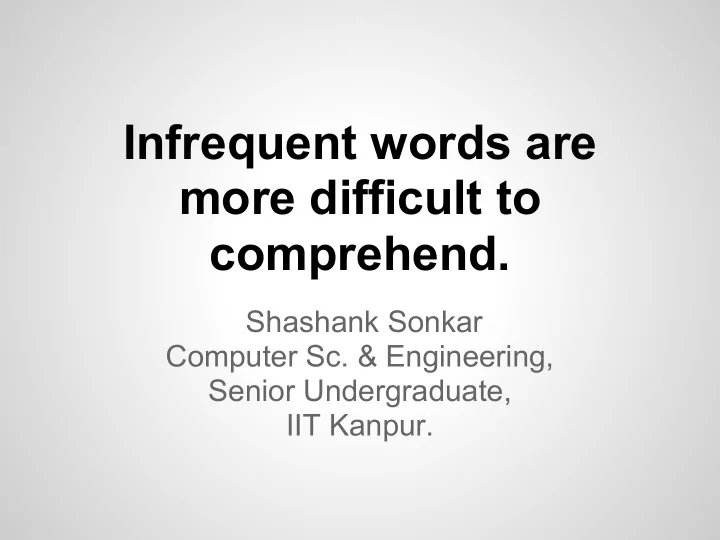

Infrequent words are more difficult to comprehend. Shashank Sonkar Computer Sc. & Engineering, Senior Undergraduate, IIT Kanpur.
Saccade ● Rapid, jerky movement of the eyes
Silent Reading
Terminology
Eye movements & Visual Cognition ● Processing vs Oculomotor model ● Eye & mind tightly linked ● Information processing in parallel with saccade programming [Becker & Jurgen, 1979] ● No serial processing, cognition simultaneous with fixation.
Linguistic factors influencing fixation 1. Word frequency 2. Number of meanings a. He went to the bank b. Subordinate bias effect ■ No disambiguating info. precedes ambiguous word ■ Disappears in "duck". Why? 3. Predictability 4. Familiarity 5. Difficulty in sentence comprehension ○ Regression
Frequency : Word recognition ● More fixation ● Effect of length ○ His painful fracture caused him trouble. ○ His painful accident caused him trouble. ● With 3-4 occurrences, fixation decreases ● Higher frequency parafoveal word affects first fixation duration ● Short within-word regression ● Experiment using Hindi Language
References 1]K. Rayner. Eye movements in reading and information processing:20 years of research. Psychological bulletin, 124:372-422, 1998. [2]Matthew S. Starr and Keith Rayner. Eye movements during reading: some current controversies. Trends in Cognitive Science, 5 (2001), pp. 156-163. [3]Inhoff, A.W. and Rayner, K. (1986) Parafoveal word processing during eye fixations in reading:effects of word frequency. Percept. Psychophys. 40, 431- 439. [4]Duffy, S. A., Morris, R. K., & Rayner, K. (1988). Lexical ambiguity and fixation times in reading. Journal of Memory and Language, 27, 429-446. [5]Images from - http://www.scholarpedia.org/article/Eye_movements
Thank you !
Recommend
More recommend